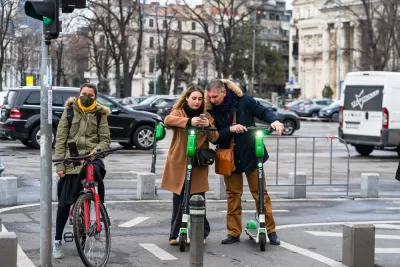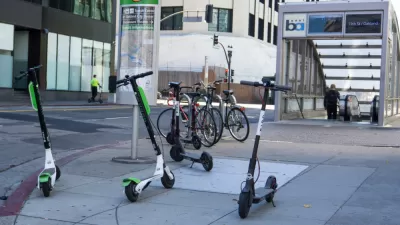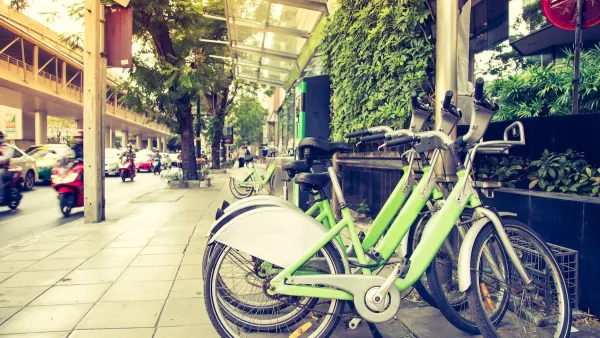Two new studies show that the adoption of shared micromobility can reduce transportation-related emissions and congestion by substantial margins.

New research shows that micromobility can reduce transportation emissions by wider margins than previously thought. Kea Wilson outlines the results of two new studies in an article for Streetsblog USA.
“The first study, conducted by academics at the Georgia Institute of Technology, found that travel times in Atlanta swelled an estimated 9 to 11 percent as a result of the city’s controversial 2019 decision to ban the modes after dark after drivers killed four riders.” During sporting events, that number shot up to 37 percent. A second report from Germany reveals that greenhouse gas emissions decreased as a result of shared micromobility adoption in six global cities. “That’s even accounting for the fact that some of those riders said they wouldn’t have made those trips at all if Lime wasn’t available — as well as the fact that others admitted to trading a comparatively greener walking, transit, or non-electric bike journey for a ride on an electric-assist mode.”
Taken together, Lime says the two studies are proof positive that cities are underestimating how critical micromobility is to their residents — and their collective climate future.
Wilson includes two caveats: the Atlanta study only had a few sporting events during the study period, and the German study was funded by Lime, a shared micromobility operator with an obvious stake in proving the benefits of the mode. Using data from just one operator also means that these studies do not necessarily reflect industry-wide trends.
Nevertheless, not all benefits of shared mobility are easily quantifiable. Wilson provides one such example: “Because even if a scooter trip does replace a walking trip, that doesn’t meant that it didn’t make someone feel safer getting home from a bus stop at night — and in the long run, give her a clean alternative to the park-and-ride.”
FULL STORY: Research: Scooters Cut Car Travel and Emissions More Than Previously Thought

Maui's Vacation Rental Debate Turns Ugly
Verbal attacks, misinformation campaigns and fistfights plague a high-stakes debate to convert thousands of vacation rentals into long-term housing.

Planetizen Federal Action Tracker
A weekly monitor of how Trump’s orders and actions are impacting planners and planning in America.

In Urban Planning, AI Prompting Could be the New Design Thinking
Creativity has long been key to great urban design. What if we see AI as our new creative partner?

Pedestrian Deaths Drop, Remain Twice as High as in 2009
Fatalities declined by 4 percent in 2024, but the U.S. is still nowhere close to ‘Vision Zero.’

King County Supportive Housing Program Offers Hope for Unhoused Residents
The county is taking a ‘Housing First’ approach that prioritizes getting people into housing, then offering wraparound supportive services.

Researchers Use AI to Get Clearer Picture of US Housing
Analysts are using artificial intelligence to supercharge their research by allowing them to comb through data faster. Though these AI tools can be error prone, they save time and housing researchers are optimistic about the future.
Urban Design for Planners 1: Software Tools
This six-course series explores essential urban design concepts using open source software and equips planners with the tools they need to participate fully in the urban design process.
Planning for Universal Design
Learn the tools for implementing Universal Design in planning regulations.
planning NEXT
Appalachian Highlands Housing Partners
Mpact (founded as Rail~Volution)
City of Camden Redevelopment Agency
City of Astoria
City of Portland
City of Laramie





























